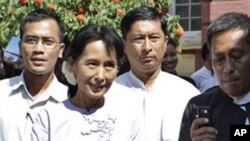China says it is confident its neighbor and ally Burma will continue what Beijing describes as a process of peace and ethnic reconciliation following the release of pro-democracy leader Aung San Suu Kyi. But an official refused to say if her freedom will have any bearing on the fate of fellow Nobel Peace Prize winner, Liu Xiaobo, jailed in China.
China says it has full faith in Burma's so-called road map to democracy following the release of Aung San Suu Kyi.
Foreign Ministry Hong spokesman Hong Lei Tuesday said Beijing is assured Burma's policies for stability and economic development will continue.
Hong says China is confident Burma will continue advancing its seven-point road map.
He says China has every faith in Burma maintaining peace and stability as it promotes ethnic reconciliation and economic and social development.
He did not specifically refer to Aung San Suu Kyi. Burma's military government freed the Nobel Peace laureate after seven years of house arrest on Saturday.
Many rights activists around the world hope that her release will put more pressure China to release this year's Nobel Peace Prize winner, Liu Xiaobo. Liu was sentenced to 11 years in prison last year for helping create Charter 08, which advocates political reform in China.
Liu's lawyer Shang Baojun says he too hopes Aung San Suu Kyi's release will add weight to calls for his client's freedom.
Shang says he and Liu supporters hope the Chinese government could follow the example and act like the Burmese government, and release Liu Xiaobo. But he says he is not optimistic.
The Foreign Ministry spokesman refused to answer any more questions from foreign correspondents about Liu's Nobel.
China is incensed by the award and has warned other country's diplomats to not attend the award ceremony on December 10 in Norway.
The government also is blocking other citizens from picking up the prize on Liu's behalf. It has banned his wife and other signatories of the charter from traveling.
China is keen to maintain stability in its southern neighbor Burma, especially along the border where spats between drug lords, rebel armies and Burma's central government have spilled over into China in the past.
China has invested heavily in Burma, buying natural resources such as gas and timber. Many Western countries, including the United States, have imposed economic sanctions on Burma's military government, which is considered one of the most repressive in the world.
